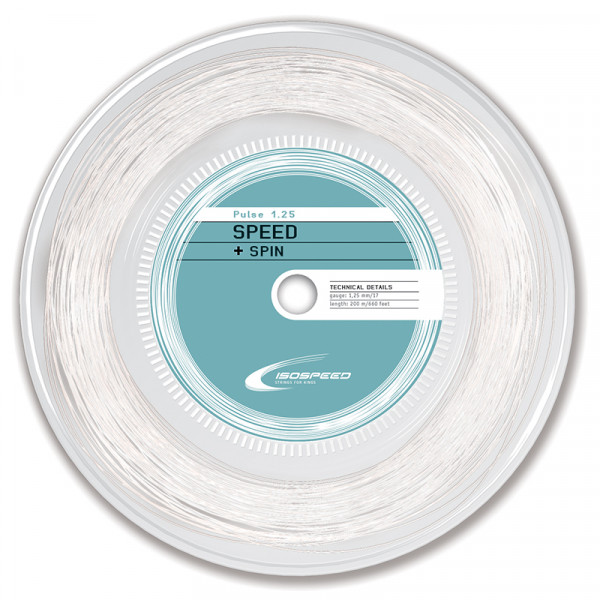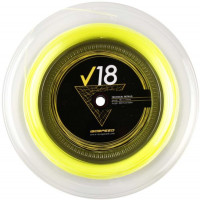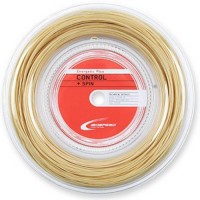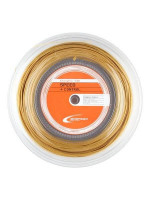Recommended retail price
| Quantity | Unit price |
|---|---|
| From 2 pcs. | 124.90€ |
Iso-Speed Pulse (200 m) - White
Discover an elevated game experience with the Iso-Speed Pulse (200 m) - White. This professionally crafted tennis string delivers exceptional game control and a dynamic feel, bringing out your best performance on the court. Impeccably designed in versatile white, this product promises the perfect blend of aesthetics and functionality.
Elite Material Combination
Made of fatigue-resistant co-polyester, the Iso-Speed Pulse (200 m) - white guarantees durability and resilience. Its monofilament structure signals a superior, high-tech design that brings a new perspective to your game. With a noticeable advantage of stability, this sterling product offers the best of tennis play essentials.
Optimal Design and Dynamics
Coming in varying string thicknesses—1.20mm, 1.25mm, and 1.30mm— Iso-Speed Pulse allows you to make a desirable choice compatible with your style of play. Imbued with a smooth string profile, this product offers a remarkable feel, complete control, and dynamic response. Your spins are about to get more lethal than ever as the Iso-Speed Pulse is tailored to enhance rotational play.
Specifications and Product Code
The Iso-Speed Pulse (200 m) - white, is a 200m long co-polyester string conveniently packed for utility and durability. Proudly carrying the manufacturer's code 39752, this product comes as a high-quality string unrivaled in its field.
The Ultimate Professional's Choice
The Iso-Speed Pulse (200 m) - white, is more than your typical tennis string. It's a commitment to proficiency, control, and heightened court sensations. Elevate your game with this superior product and swim in the praises showered by colleagues and opponents alike. Brace for the power of gameplay unrevealed, unlock the Iso-Speed Pulse today.
| Product number: | ST14758.1 |
| Color: | White |
| String length (m): | 200 |
| String profile: | soft |
| Structure: | monofilament |
| Material: | co-polyester |
| Properties: | control, dynamic, feel |
How to choose a tennis string?
Tennis racket’s motor is its string – at least that’s how we say. And it’s true. Quality of the game depends heavily on the type of the string and on its string tension (measured in kilograms, between 20 and 30 kg). These days there are more and more new rackets on the market without strings. It results from the fact that every tennis player should choose string and its tension according to his/her own preferences. It is very often recommended to change the basic string (if a racket has it) after the purchase and make a new one. Tension which was used in the factory to make a string and time which has passed since that can lead to poor game quality despite the fact that a good racket has been chosen. While choosing a string you should take into consideration its flexibility and size. Tension with which string should be made is usually given by the producer and it depends mostly on durability of the frame. Strings have one essential disadvantage – they have to be changed regularly. Frequency of string changing depends mainly on strength of player’s strokes, frequency of game, string size, type of balls (heavy balls cause the string to break quicker), randomness (impure stroke at frame), string moistness (natural strings made of animal guts use to break especially often). It is recommended to change string at least once a year even if it didn’t break. It results from the fact that string loses some of its features over time, particularly flexibility because of temperature changes and tension which is reduced while playing. We don’t adjust string to the racket. We choose string considering game style and own preferences.
Types of strings
There are a lot of types of tennis strings considering the material they are made of and their construction. Regarding used materials we can distinguish: the least comfortable (‘wire’), more comfortable strings, soft (polyester strings), synthetic, the most comfortable, but also very expensive natural strings, which are the least durable. Considering structure we can distinguish monofilament and multifilament strings – very comfortable with a good combination of playability and endurance. There are variations in between these extremes: from core with single rim, with many rims, with extra outside rim (e.g cube cross section shape), till the use of different materials in the same string.
String tension
String tension is very important for control and strength of the shot, flexibility and durability of the string. Reducing string tension makes string more comfortable (better reduces vibrations) and elastic. The ‘trampoline efect’ appears which causes that power is increasing and control is decreasing. Higher string tension makes opposite reactions.
Gauge
The size of the string especially affects durability and flexibility. The size of the string is specified in millimeters between 1.1-1.4mm. The smaller the size of the string, the higher the flexibility. The higher the flexibility, the bigger ‘trampoline effect’ and the faster the ball, however in the same time the more the flexibility the better reduction of vibrations (higher comfort). Bigger size of the string means harder string – worse reduction of vibrations – less comfort. Players that are using a lot of spin should choose a thinner string, because it helps to generate spin. But the thinner the string, the less durability. In addition size of the string depends on string pattern. Thinner size of the string should be chosen to close string pattern.
Playability and durability of the string
A lot of brands use designation „playability” and „durability”. Unfortunately the more playable string, the less its durability. The highest durability have thick monofilament strings while thin multifilament and natural strings offer the best playability. All strings currently available on the market are a combination of these two details and also a compromise between playability and durability. There is no string that will guarantee both of this parameters.
Rules worth to follow when changing the string
- thinner strings are better for generate more spin
- softer strings are reducing vibrations better then harder one
- thinner or more flexible strings allow to hit the ball faster
- thinner strings should be chosen for rackets with close string pattern and smaller headsize
- for rackets with high stiffness you shouldn't use very hard and thick strings
- stiff, monofilament strings are more durable
- multifilament strings are more comfortable, but less durable
- flexible strings give better acceleration then stiff one
- close string pattern (e.g. 18/20) gives better control, but less power and spin
- open string pattern (e.g. 16/19) increase power and spin while control is worse
- rackets with bigger headsize give better dynamic and spin but decrease control
- harder string tension gives more control but decrease power and spin
- soft string tension gives better dynamic and spin (“shots go more inside the racket”), but control and durability are wrose
- thinner strings are healthier and more playable but less durable
-thicker strings offer better durability
-flexible strings offer better comfort, especially for players with tennis elbow. At the same time it gives more spin and power while durability decreases
-stiff strings offer better durability, however comfort of the game and power are smaller









